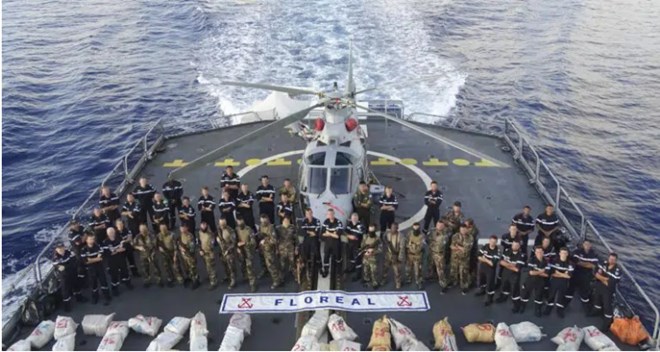Naval News
Thursday April 21, 2022

Between 14 th and 18 th April, the French surveillance
frigate Floréal, under Atalanta’s command, successfully carried out four
consecutive drugs seizures in the international waters while engaged in
counter-piracy patrol. As a result, she seized close to 1.400kgs of heroin,
1.200kg of methamphetamines, and 25kg of hashish, worth 50 to 60 million euros
in wholesale value and more than 200 million euros (236 million USD) in the
street value in Europe (according to the data of the United Nations Office on
Drugs and Crime – UNODC).
These four consecutive seizures happened when FS Floréal was
heading northbound, following the Smack Track, one of the drugs routes in the
Western Indian Ocean, which connects the northern coast of the Arabian Sea to
the Southern-Eastern African Coast, to eventually end up on the European
markets.
While the number of drug users in Africa is estimated to
rise by 40 percent by 2030 according to the UNODC, these four drugs
interdiction operations in only five days off the coasts of Somalia, Kenya, and
Tanzania – an unprecedented event in the area – prove that the fight against
drug trafficking is more necessary than ever.
With the increased use of waterways routes, the
counter-narcotics executive task of Atalanta is intimately linked to its core
mission of counter-piracy operation, as the former pirate networks maintain
their capabilities to act at sea by participating in all forms of illegal
traffics, sometimes for the benefit of the terrorist groups. Through its
operations, Operation Atalanta also contributes to tackle the financial flows
of the criminal networks and the violent extremist organizations in the wider
East Africa, from Mozambique to the north of Somalia.
With the commitment of its member states, the European Union
through Operation Atalanta will continue to provide maritime security in the
Western Indian Ocean and the Red Sea. By tackling the criminal networks in the
maritime domain, Atalanta will remain committed uphold the freedom of
navigation of the maritime shipping by monitoring and protecting the transit of
fishing, commercial, energetic and humanitarian vessels in the area.